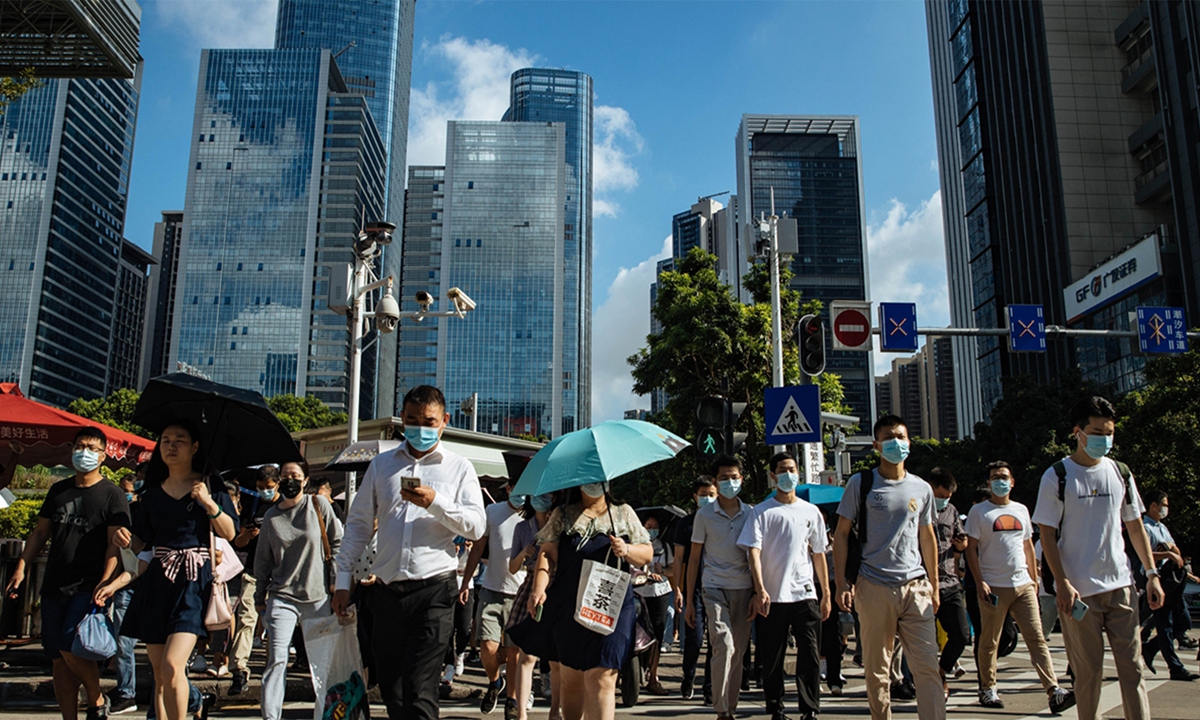Shenzhen ushers in new pilot reforms
By Chen Qingqing, Chi Jingyi and Chu Daye Source: Global Times Published: 2020/10/12 0:23:39 Last Updated: 2020/10/12 0:29:19
Integration of Greater Bay Area fends off risks amid China-US tension

Shenzhen
In a highly anticipated move, China's central authorities released detailed measures on Sunday which aim to build Shenzhen, a city neighboring Hong Kong, into a socialist demonstration area in the next five years, underscoring the country's determination of further opening-up amid growing external pressure, as well as its ambition of integrating its reform pioneer deeper into a greater bay area that could rival others like Tokyo and San Francisco.
Supporting Shenzhen, in South China's Guangdong Province, to pilot the comprehensive authorized reform measures is another significant step to advance the city's opening-up in the new era and a key move in building a pilot demonstration area of socialism with Chinese characteristics, said the document jointly issued by the general offices of the Communist Party of China Central Committee and the State Council on Sunday.
A series of measures came along with the document such as further relaxation of market access for foreign capital on cutting-edge technologies, establishing a special negative list for the city and further opening up in sectors including energy, telecoms, public utilities, transport and education, among others.
Meanwhile, local authorities will further expand opening-up in the financial and shipping sectors, for example, by supporting local enterprises in Shenzhen to go overseas for listed financing and supporting the city to advance the internationalization of the Chinese yuan and promote the improvement of the foreign exchange management mechanism.
In addition, qualified foreign financial institutions are encouraged to set up companies engaged in securities, fund management and qualified foreign investment institutions are eligible to obtain payment business licenses in Shenzhen in accordance with the law.
The detailed policies came more than a year after the central government first announced on August 18, 2019 that it intended to build Shenzhen into a pilot demonstration area of socialism with Chinese characteristics.
The new policies were released as locals celebrate the 40th anniversary of the establishment of the Shenzhen Special Economic Zone (SEZ). As China's first SEZ, the economic miracle of the southern Chinese city has become inspiring and meaningful, which is expected to be a role model for the rest of the country, especially when uncertainties grow amid escalating US-China tension, sluggish global recovery amid COVID-19 outbreaks and the drift toward anti-globalization.
Also, over the past year when its neighboring city the Hong Kong Special Administrative Region (HKSAR) had experienced unprecedented social turmoil, whether Shenzhen could replace it as a new financial hub was occasionally discussed among academics, investors and residents from both sides. Particularly, at the celebration activities for the 40th anniversary of the establishment of Shenzhen SEZ in late August, Carrie Lam, Chief Executive of the HKSAR, attended the opening ceremony of the seventh land port on the Hong Kong-Shenzhen border, which was interpreted as acknowledging closer links between the two cities, experts said.
Instead of being replaced by one another, Shenzhen, along with the HKSAR and Macao SAR, are believed to be key players which will inject new growth momentum for the Guangdong-Hong Kong-Macao Greater Bay Area, according to experts.
Further opening-up
More opening-up measures, including a unique negative list for market access especially for the city, will give further impetus and growth potential to what is already the most open and vibrant economic jurisdiction in China, Bai Ming, deputy director of the international market research institute at the Chinese Academy of International Trade and Economic Cooperation, a think tank under the Ministry of Commerce, told the Global Times on Sunday.
"Even if in the future such models are adopted by other cities, Shenzhen will still attain its special strengths with the differentiators such as its unique negative list for market access," Bai said.
The policy benefits will be felt by other cities in the Greater Bay Area, including Hong Kong and Macao, Bai said. "It can be expected that Hong Kong could benefit more from the development of the bay area."
Political unrest and coronavirus outbreak have dragged the once-prosperous Asian city into deep recession. While the national security law for Hong Kong began to help the city restore stability, Lam emphasized at the National Day celebration on October 1 that "to help extract Hong Kong from our economic predicament, we must create new engines of economic growth with the continued support of the central government." Taking forward the development of the bay area and working with Shenzhen are also two major tasks for the Asia's financial hub, Lam said.

Children play with a robot dog in Shenzhen, South China's Guangdong Province in August 2020. Photo: GT/Li Hao
Full integration
Wang Peng, assistant professor of the Gaoling School of Artificial Intelligence at the Renmin University of China, said that the newly released implementation plan mainly includes detailed plans for digital infrastructure, financial and capital reform, real economy development and high-tech industry development, which can better promote the coordinated development of the Greater Bay Area.
"With the development of Shenzhen, Hong Kong and Macao can also share the dividends of the Greater Bay Area. Some experienced companies and institutions will be able to list in Shenzhen, and foreign investors in high-tech industries and digital infrastructure construction can access the Shenzhen market. Shenzhen is not competing with Hong Kong and Macao, but it has built a more integrated platform for development," Wang told the Global Times on Sunday.
Fintech and financial development have a presence in Shenzhen, but the city is not yet China's financial center, at least for now, especially compared with Hong Kong. Facing the future, Shenzhen needs to become another pole of China's financial center through a more favorable and compliant market, a better business environment and a more sophisticated access system to the capital market, Wang said.
Some foreign investors and companies cheered this package of "gifts" that the central authorities have offered to Shenzhen, which is always seen as a frontrunner in making changes while adjusting to its role in dealing with new challenges.
Shenzhen was a testbed for reform and market opening, and it has played a very important role not only in developing the Shenzhen area but also in serving as a pilot for development elsewhere in China, well ahead of other regions. People tend to forget this, but a lot of new things were tested in Shenzhen 40 years ago and then eventually developed in the rest of China, Denis Depoux, Senior Partner and Global Managing Director of Roland Berger, told the Global Times.
"The next 40 or 50 years is all about the Greater Bay Area," Depoux said, noting that it is also about connecting different cities including Shenzhen, Guangzhou, Zhuhai and Dongguan, with an environment which is quite similar to Tokyo Bay.
Crucial reform
As part of the financial opening-up, the new document indicates support for the internal closed pilot test of the digital renminbi and the development and application of the digital currency and international cooperation, when the city is scheduled to distribute 10 million yuan ($1.49 million) to its residents in the form of digital currency starting October 12.
"This indicates that China will enhance international cooperation in digital currency in the future, and that it will conduct a wider range of digital currency tests if the trial goes well," Chen Bo, director of the Finance Research Center at the Institute of Finance and Economics at the Central University of Finance and Economics, told the Global Times on Sunday.
Given the current situation, especially because the US has begun to consider some financial sanctions against China, these financial reform measures in Shenzhen should also be in preparation for potential risks, Chen said.